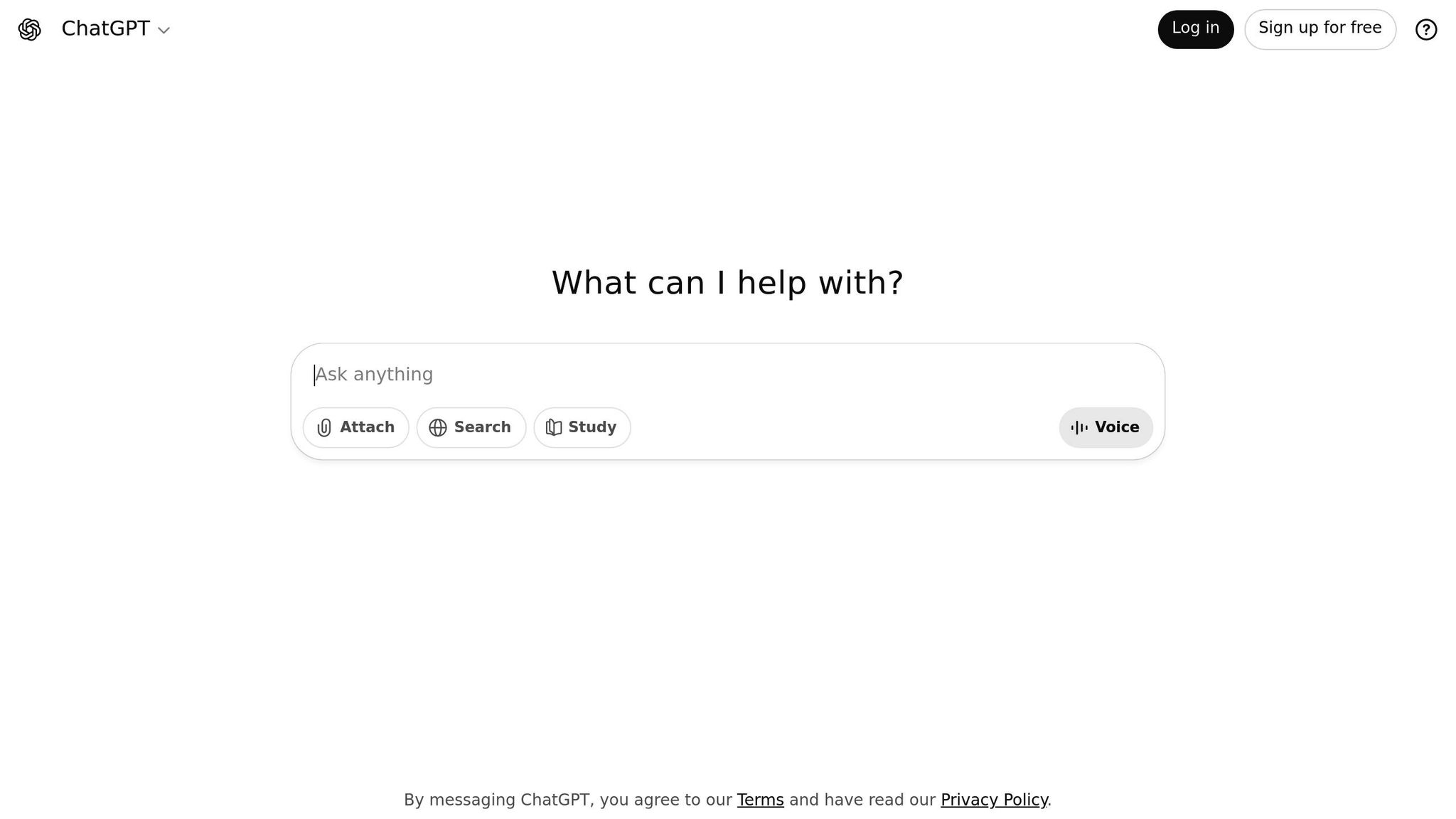AI Prompts for Financial Goal Planning

AI tools like ChatGPT, Claude, and Gemini are transforming financial planning, making it easier to set, track, and adjust goals. With only 33% of Americans having a written financial plan, many struggle to manage retirement savings, debt repayment, and investments. AI simplifies these challenges by offering personalized, actionable insights. For example:
- Calculate monthly savings: "What monthly contribution is needed to save $1,500,000 by age 65, starting with $50,000?"
- Compare strategies: "Which is better for me - debt snowball or avalanche method?"
- Plan for life changes: "Adjust my budget after a 20% income increase."
These tools cater to individual needs, factoring in local financial scenarios, inflation, and market shifts. Platforms like God of Prompt provide curated AI prompts to streamline financial planning, helping users save time and make informed decisions. Whether you're saving for a home, building an emergency fund, or planning investments, AI empowers you to take control of your finances.
AI-Powered Finance: 9 Prompts You Must Try in ChatGPT | Google Gemini |

1. Setting Financial Goals
Laying out clear financial goals is the cornerstone of effective financial planning. The key is turning vague aspirations into specific, measurable objectives. This is where AI prompts shine - helping define exactly what you want, by when, and how much you can realistically save or invest. These prompts pave the way for detailed strategies around saving, investing, and breaking down your goals.
Calculate Exact Monthly Savings for Big Goals
Instead of asking yourself general questions like, "How much do I need to save for retirement?", AI can provide precise answers. For example, a prompt like "What monthly contribution is required to save $1,500,000 by age 65, starting with $50,000?" transforms a broad question into an actionable plan. In one real-life example from 2023, a 35-year-old used an AI tool to calculate their monthly savings target, factoring in expected investment returns. The result? A clear, actionable plan that accounted for compound growth.
This same precision applies to shorter-term goals. Let’s say you’re aiming to save $500,000 in five years with an annual return of 6%. AI can calculate that you’d need to save roughly $7,500 per month. These kinds of insights turn abstract ambitions into practical steps you can budget for and track.
Choose the Right Asset Allocation for Your Goals
Hitting your financial targets isn’t just about saving - it’s also about investing wisely. AI prompts like "What asset allocation should I use to achieve a 7% annual return with moderate risk?" can guide you in balancing risk and reward. By considering factors like your age, timeline, and comfort with market volatility, the AI can suggest specific percentages for stocks, bonds, and other investments. This eliminates the need for hours of research and gives you a clear starting point for building a portfolio that aligns with your goals.
Break Big Goals into Manageable Milestones
Big financial goals can feel overwhelming, but breaking them into smaller, time-bound steps makes them far more achievable. For instance, a prompt such as "Create a savings plan to build a $25,000 emergency fund in three years" delivers monthly milestones. This approach works for a variety of objectives, whether it’s saving for a $350,000 home or planning for education costs. By including details like your current savings, target amount, and timeline, AI can suggest realistic monthly savings targets that fit your budget. These smaller, manageable steps help you stay motivated by celebrating progress along the way.
This structured, detailed approach to setting financial goals is just the beginning of what AI-powered planning can offer. For more ideas and inspiration, check out the extensive library of AI prompts available on God of Prompt. They’re designed to help you refine and personalize your financial strategy.
2. Tracking Financial Progress
Once you've set your financial goals, the next step is keeping an eye on your progress. This means regular monitoring and making adjustments as needed. AI tools are great at taking complex financial data and turning it into clear, actionable insights. They can show you exactly where you stand and what needs tweaking.
Generate Monthly Progress Reports with Specific Metrics
Tracking works best when you have detailed snapshots of your finances. For example, asking AI something like "Help me categorize and analyze my last three months of expenses" can uncover spending habits you might not have noticed. These tools can identify trends over time, giving you a clearer picture of where your money is going. In fact, financial platforms using AI report that users who track their progress with automated tools are up to 40% more likely to hit their savings targets compared to those who don’t. The trick is to be specific - whether you need a budget breakdown, an expense tracker, or a summary of your investments. When your request is clear, AI can deliver insights that make adjusting your financial plan much easier.
Compare Actual Performance Against Your Original Plan
AI is also excellent at identifying gaps between your plan and reality. For instance, you can use prompts like "Compare the results of the debt snowball and avalanche methods" to evaluate your debt repayment strategy. Want to assess your investments? Try asking, "What impact will inflation and market volatility have on my investment portfolio over the next 10 years?" These prompts use historical data to offer forecasts, helping you understand how economic changes might influence your long-term goals. This kind of analysis is key - it highlights when your progress isn’t lining up with your expectations, so you can adjust your strategy accordingly.
Track Short-Term Savings with Weekly and Monthly Check-ins
Short-term goals require more frequent check-ins to stay on track. For example, asking AI to "Plan my monthly savings for a $5,000 family vacation" can break down an annual goal into smaller, manageable targets. A 2023 survey by the National Endowment for Financial Education found that only 31% of U.S. adults regularly track their spending, which underscores the importance of these automated tools. The best prompts include specific amounts, clear deadlines, and measurable outcomes. This makes it easier to monitor progress and adjust quickly if needed.
For more advanced templates and financial tracking tools, the God of Prompt's Complete AI Bundle offers specialized prompts for finance and business planning, helping automate much of the work involved in tracking your progress.
sbb-itb-58f115e
3. Adjusting Strategies
Financial plans aren’t static - they need regular tweaks to stay aligned with your life and the ever-changing markets. Spotting the right moments to make adjustments and using precise prompts can help keep your strategy effective. These updates work hand-in-hand with the goal-setting and progress tracking steps we’ve already discussed.
Recognizing When It’s Time to Adjust
Timely adjustments are key to keeping your financial strategy on track. AI can be a powerful tool for identifying issues early through variance analysis. For example, you could use prompts like:
"Analyze my monthly spending and identify categories where I went over budget by more than 10%" or "Review my investment portfolio and flag any assets that underperformed the S&P 500 over the past year".
The more specific you are in your prompts - mentioning exact percentages, timeframes, or benchmarks - the better the insights you’ll receive.
Adapting to Market and Economic Changes
Markets and economies are in constant flux, so your financial strategy needs to adapt. AI can help you anticipate and respond to these shifts. For instance, you might ask:
"How should I adjust my portfolio if the Federal Reserve raises interest rates by 1%?" or "What changes should I make to my savings plan if inflation exceeds 4%?".
With current economic data, AI can even suggest tailored asset allocations, such as a 60/30/10 split between stocks, bonds, and alternatives, based on your risk tolerance and market conditions.
Adjusting After Major Life Events
Life events like a new job, marriage, or the arrival of a child often call for financial recalculations. AI can simplify this process, offering quick and practical adjustments. Consider prompts such as:
"Create a new monthly budget for my household after a 20% income increase" or "Suggest changes to my financial plan after having a child, including new expenses and savings goals".
You can also explore trade-offs with prompts like:
"Compare the long-term financial impact of paying off my mortgage early versus investing extra funds in a 401(k)".
For more in-depth strategies and tools to streamline these adjustments, platforms like God of Prompt provide resources to automate much of the heavy lifting, making it easier to keep your financial plans on point as life evolves.
4. Personalized Financial Planning
Crafting Tailored Financial Strategies with AI
AI takes financial planning to the next level by creating customized strategies that align with your specific goals, timeline, and risk tolerance. Instead of asking broad questions like, "How should I save for retirement?" you can get precise answers by asking, "What monthly contribution is needed to save $1,500,000 by age 65?" This approach ensures that every aspect of your financial plan is tailored to your needs.
Take budgeting, for example. A prompt like, "Create a monthly budget for a family of four with an $8,000 income," generates a clear and actionable plan that aligns with your financial objectives. It’s not just about numbers - it’s about making them work for your unique situation.
When it comes to investments, AI can help you assess your risk tolerance and craft a portfolio that fits your goals. For instance, if you ask, "What’s an optimal investment portfolio for a 35-year-old with moderate risk tolerance and $50,000 to invest?" you’ll receive portfolio suggestions designed to match your preferences and capacity.
The beauty of AI-driven planning lies in its ability to adapt. As your circumstances change, you can refine your strategy with updated data. For example, more than 60% of U.S. adults now use digital tools for financial management, and AI-powered solutions have been shown to improve budgeting accuracy and savings rates by up to 20%.
AI also simplifies complex financial decisions. Consider a prompt like, "Compare the benefits of a 15-year mortgage versus a 30-year mortgage for a first-time buyer earning $75,000 annually." This kind of tailored comparison helps you make informed choices based on your unique financial profile.
To keep your financial plan effective, it’s essential to regularly update your data. AI ensures your strategy stays dynamic and responsive, adapting to life’s inevitable changes. By integrating these personalized blueprints, you can maintain a financial plan that evolves with you.
For a deeper dive into AI-powered financial tools, platforms like God of Prompt offer a wide range of specialized prompts to simplify the planning process, making sophisticated financial strategies accessible to anyone. Whether you’re budgeting, investing, or planning for the future, these resources can help you take control of your finances with confidence.
Conclusion
Building on the strategies and tracking methods discussed earlier, AI is reshaping how Americans approach financial planning. These tools are making planning not only more accessible but also more efficient. The shift from traditional, spreadsheet-heavy methods to AI-powered solutions isn't just about adopting new technology - it's a complete transformation in how we manage and envision our financial futures.
AI-driven tools bring speed, accuracy, and a level of personalization that traditional methods simply can't match. They provide real-time insights and updates, which is a significant improvement over manual calculations that are often error-prone and reviewed infrequently. With AI, users can receive specific financial targets and asset allocation recommendations, all while benefiting from continuous monitoring.
What sets AI prompts apart is their ability to deliver solutions tailored to individual needs. Whether it’s helping a family earning $8,000 a month with household budgeting or crafting intricate investment plans for high-net-worth individuals, these tools adapt to unique financial circumstances. They also make complex concepts - like compounding, risk tolerance, and diversification - clear and actionable.
This shift also marks a democratization of financial planning. Tools that were once the domain of financial professionals are now available to everyone. For U.S. users, this means access to AI prompts designed for scenarios like comparing mortgage options or planning for college expenses within the American education system. These tools make it easier for individuals to take control of their finances with confidence and clarity.
Platforms such as God of Prompt play a significant role in this transformation. With a vast library of expertly curated prompts for tools like ChatGPT and Claude, users can save up to 20 hours per week. The platform’s 4.8 out of 5 rating from 743 reviews speaks to its effectiveness, with many users reporting increased productivity and better financial outcomes.
The real power of AI in financial planning lies in its ability to complement human judgment. While these tools offer precise insights and recommendations, personal context and professional advice remain essential for making final decisions. Staying informed about new AI tools and prompt libraries ensures you're equipped with the most advanced and user-friendly solutions available.
Whether you're starting to map out your financial journey or refining an existing plan, AI prompts provide the precision and flexibility needed to navigate today’s dynamic economic landscape. This technology isn’t just changing the way we plan - it’s empowering individuals to take control of their financial futures with confidence and clarity.
FAQs
How can AI tools like ChatGPT help me create a flexible financial plan that adapts to life changes and market trends?
AI tools, like ChatGPT, can play a key role in creating a financial plan that fits your unique situation. By analyzing details such as your goals, income, expenses, and priorities, they can offer advice that’s tailored to your needs. Whether it’s suggesting budgeting techniques or simulating various financial scenarios, these tools help you make more informed choices.
What’s more, AI can adjust as your circumstances change - whether it’s a shift in income, unexpected costs, or market ups and downs. By keeping your information updated, ChatGPT can provide fresh recommendations to ensure your financial plan stays aligned with your goals as they evolve.
How can AI prompts improve financial goal setting and tracking compared to traditional methods?
AI prompts can transform the way you approach financial goal planning by making the process faster, more tailored, and easier to act on. Unlike old-school methods, AI can quickly sift through your financial data, offering strategies that align with your specific situation and helping you set achievable goals.
Another advantage? AI provides real-time updates and insights, so you can monitor your progress and tweak your plans on the go. This combination of automation and personalization not only saves time but also eliminates much of the uncertainty that often comes with traditional financial planning.
How can AI tools help provide accurate and reliable financial advice and projections?
AI tools utilize sophisticated algorithms and extensive datasets to examine financial trends, spot patterns, and provide insights designed to match your objectives. By analyzing historical data and applying predictive models, these tools can deliver projections and practical recommendations.
That said, while AI can be an incredibly useful resource, it’s always wise to review its suggestions with a financial professional. This ensures the advice is tailored to your unique situation and goals.






















